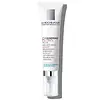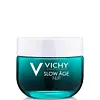What's inside
What's inside
 Key Ingredients
Key Ingredients

 Benefits
Benefits

 Concerns
Concerns

 Ingredients Side-by-side
Ingredients Side-by-side

Water
Skin ConditioningIsocetyl Stearate
EmollientGlycerin
HumectantOctyldodecanol
EmollientPropylene Glycol
HumectantPentylene Glycol
Skin ConditioningDimethicone
EmollientAcrylamide/Sodium Acryloyldimethyltaurate Copolymer
Emulsion StabilisingCetearyl Alcohol
EmollientDimethicone/Vinyl Dimethicone Crosspolymer
Skin ConditioningCaffeine
Skin ConditioningIsohexadecane
EmollientSodium Hyaluronate
HumectantSodium Hydroxide
BufferingRetinol
Skin ConditioningRetinyl Linoleate
Skin ConditioningAdenosine
Skin ConditioningAmmonium Polyacryloyldimethyl Taurate
Emulsion StabilisingCaprylyl Glycol
EmollientCitric Acid
BufferingPolysilicone-8
Polysorbate 80
EmulsifyingPhenoxyethanol
PreservativeWater, Isocetyl Stearate, Glycerin, Octyldodecanol, Propylene Glycol, Pentylene Glycol, Dimethicone, Acrylamide/Sodium Acryloyldimethyltaurate Copolymer, Cetearyl Alcohol, Dimethicone/Vinyl Dimethicone Crosspolymer, Caffeine, Isohexadecane, Sodium Hyaluronate, Sodium Hydroxide, Retinol, Retinyl Linoleate, Adenosine, Ammonium Polyacryloyldimethyl Taurate, Caprylyl Glycol, Citric Acid, Polysilicone-8, Polysorbate 80, Phenoxyethanol
Water
Skin ConditioningDimethicone
EmollientGlycerin
HumectantPropylene Glycol
HumectantNiacinamide
SmoothingAlcohol Denat.
AntimicrobialDipropylene Glycol
HumectantBifida Ferment Lysate
Skin ConditioningCaffeine
Skin ConditioningSodium Chloride
MaskingPEG/PPG-18/18 Dimethicone
EmulsifyingTocopherol
AntioxidantCaramel
Cosmetic ColorantSodium Benzoate
MaskingAdenosine
Skin ConditioningPhenoxyethanol
PreservativeScutellaria Baicalensis Root Extract
AstringentResveratrol
AntioxidantParfum
MaskingIngredients Explained
These ingredients are found in both products.
Ingredients higher up in an ingredient list are typically present in a larger amount.
Adenosine is in every living organism. It is one of four components in nucleic acids that helps store our DNA.
Adenosine has many benefits when used. These benefits include hydrating the skin, smoothing skin, and reducing wrinkles. Once applied, adenosine increases collagen production. It also helps with improving firmness and tissue repair.
Studies have found adenosine may also help with wound healing.
In skincare products, Adenosine is usually derived from yeast.
Learn more about AdenosineCaffeine is most associated with coffee, tea, and cacao. In skincare, it helps with calming inflammation and is rich in antioxidants.
While caffeine is used to treat cellulite and and dark circles, further studies are needed to prove this. It has been believed to help with these skin conditions due to its ability to dilate blood vessels and increase blood flow.
Some studies are looking into caffeine's ability to protect against UV rays.
Learn more about CaffeineDimethicone is a type of synthetic silicone created from natural materials such as quartz.
What it does:
Dimethicone comes in different viscosities:
Depending on the viscosity, dimethicone has different properties.
Ingredients lists don't always show which type is used, so we recommend reaching out to the brand if you have questions about the viscosity.
This ingredient is unlikely to cause irritation because it does not get absorbed into skin. However, people with silicone allergies should be careful about using this ingredient.
Note: Dimethicone may contribute to pilling. This is because it is not oil or water soluble, so pilling may occur when layered with products. When mixed with heavy oils in a formula, the outcome is also quite greasy.
Learn more about DimethiconeGlycerin is already naturally found in your skin. It helps moisturize and protect your skin.
A study from 2016 found glycerin to be more effective as a humectant than AHAs and hyaluronic acid.
As a humectant, it helps the skin stay hydrated by pulling moisture to your skin. The low molecular weight of glycerin allows it to pull moisture into the deeper layers of your skin.
Hydrated skin improves your skin barrier; Your skin barrier helps protect against irritants and bacteria.
Glycerin has also been found to have antimicrobial and antiviral properties. Due to these properties, glycerin is often used in wound and burn treatments.
In cosmetics, glycerin is usually derived from plants such as soybean or palm. However, it can also be sourced from animals, such as tallow or animal fat.
This ingredient is organic, colorless, odorless, and non-toxic.
Glycerin is the name for this ingredient in American English. British English uses Glycerol/Glycerine.
Learn more about GlycerinPhenoxyethanol is a preservative that has germicide, antimicrobial, and aromatic properties. Studies show that phenoxyethanol can prevent microbial growth. By itself, it has a scent that is similar to that of a rose.
It's often used in formulations along with Caprylyl Glycol to preserve the shelf life of products.
Propylene Glycol is an odorless, colorless liquid. As a humectant, it helps skin retain moisture. It also aids in delivering active ingredients.
Another role of this ingredient is preventing a product from melting or freezing. Propylene glycol also adds antimicrobrial properties to a product, elongating product lifespan.
This ingredient is considered an organic alcohol and commonly added into both cosmetics and foods.
Those with sensitive skin or conditions may develop a rash when using this ingredient.
Learn more about Propylene GlycolWater. It's the most common cosmetic ingredient of all. You'll usually see it at the top of ingredient lists, meaning that it makes up the largest part of the product.
So why is it so popular? Water most often acts as a solvent - this means that it helps dissolve other ingredients into the formulation.
You'll also recognize water as that liquid we all need to stay alive. If you see this, drink a glass of water. Stay hydrated!
Learn more about Water